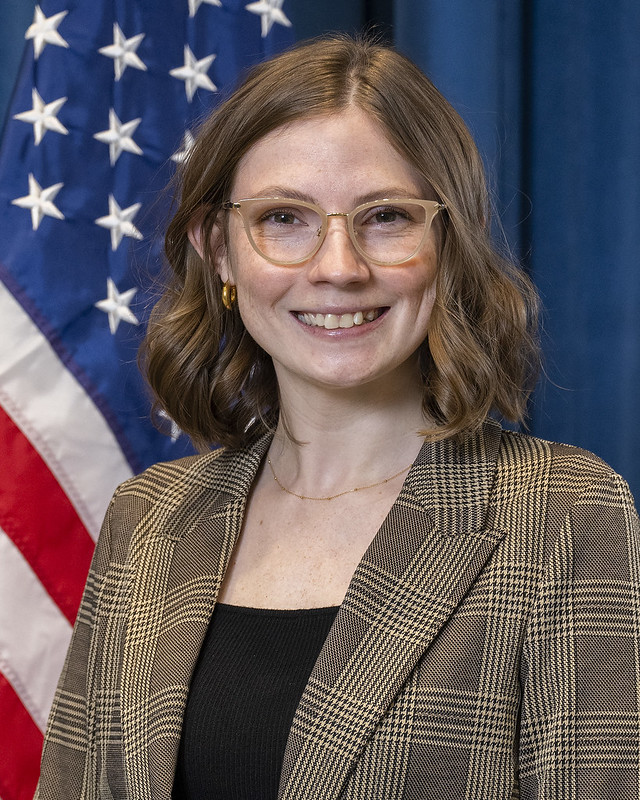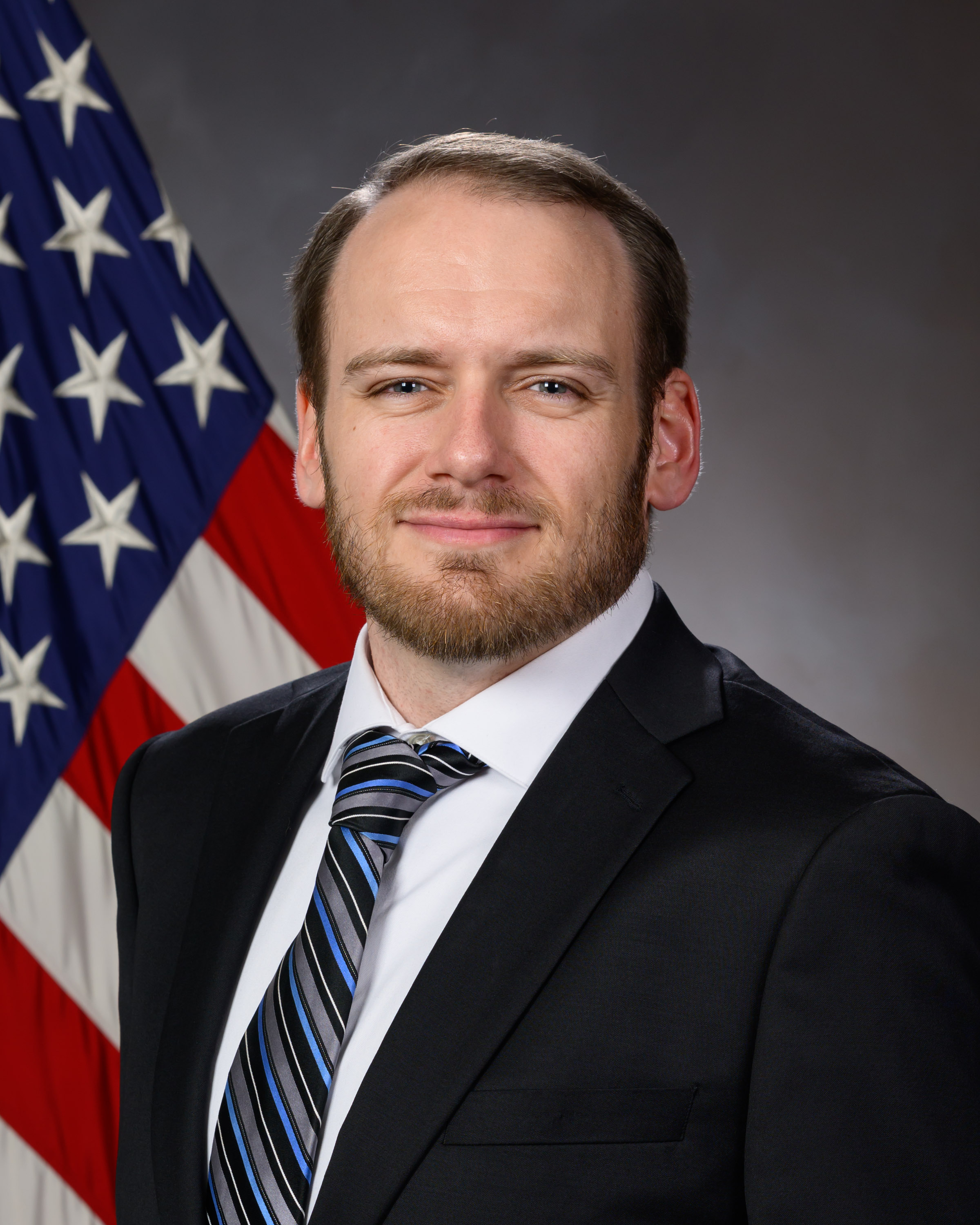AFIT Graduate Assistant Program Provides Academic Growth and Career Development
Graduate assistants play a crucial role in enhancing productivity and serving the Air Force Institute of Technology mission by performing advanced research in AFIT labs or supporting technical instruction in AFIT classes. AFIT offers exceptional academic and research experiences for GA students by preparing them to make meaningful contributions in defense while pursuing a master’s or doctorate degree in critical technical areas. These positions not only strengthen and support the AFIT mission, but also provide invaluable opportunities for academic growth, career development, and professional advancement. Qualified candidates must possess a relevant undergraduate degree, excellent communication skills, and U.S. citizenship.
We recently caught up with two GAs from the Graduate School of Engineering and Management to learn more about their experience at AFIT. Read the Q&As below to find out how AFIT has impacted their careers.

Halley Turner is currently a GA in AFIT’s Department of Engineering Physics (ENP) and Center for Directed Energy (CDE). Haley has a B.S. in Atmospheric Science from The Ohio State University and is pursuing a Master of Science in Atmospheric Science at AFIT with an anticipated graduation date of December 2025.
Q. What has been the most rewarding aspect of your AFIT graduate assistantship?
A. The most rewarding aspect of being a GA has been the professional relationships I have developed in the process. I have learned so much in my time as a GA, largely due to the mentorship of my colleagues in ENP and the CDE. Being surrounded by intelligent, passionate individuals who genuinely care about their research is infectious, and all of them encourage the best work out of GAs. Everyone is willing to lend a helping hand whenever needed, or even just a listening ear. I have grown as a student and as a scientist thanks to my colleagues and couldn’t be more grateful.
Q. How do you think your time as a GA has prepared you for your future career or studies?
A. Prior to working and studying at AFIT, my undergraduate studies primarily focused on weather forecasting, synoptic/mesoscale phenomena and the atmospheric dynamics that drive the weather. However, in my GA role, I have been introduced to the world of atmospheric aerosols: the nanometer to micrometer particles that, despite their size, have a significant impact on our daily lives. This introduction has given me a new career path to pursue, which is aerosol research. In my undergrad, I hardly knew what an aerosol was, but now I have a deeper understanding and appreciation for the research into understanding these tiny particles. I hope to contribute to this research, both in the directed energy/Department of Defense sector and the climate sector. Finding this new passion is entirely thanks to my GA research experience at AFIT.
Q. What career goals do you plan to pursue after graduation?
A. Post-graduation, I hope to be continuing my career with the DoD, specifically a research role in which I can apply my knowledge of atmospheric aerosols and general atmospheric science. Applying my experience with directed energy would also be a plus. My long-term goal is to eventually work for the National Oceanic and Atmospheric Administration (NOAA) to contribute to climate-focused aerosol research, specifically the impacts of aerosol optical properties on our climate.
Q. What advice would you give to new students starting their graduate journey?
A. It is hard to avoid being cliché with this question, but my genuine response is to be kind to yourself throughout your graduate journey. Like undergrad, the workload will naturally fluctuate, the difficulty ebbs and flows. Classes are straightforward, with defined objectives and due dates. Thesis work, however, presents a different kind of challenge and opportunity. You will receive mentorship throughout the process, but ultimately, you’re in charge of your research direction and timeline. This is a great opportunity to learn about your own work style and develop effective research strategies. Experiment with different approaches: setting daily research goals, breaking down large tasks into smaller ones, or just using to-do lists. Remember to prioritize your self-care and take breaks. Embracing this learning process, and being kind to yourself, will lead to a very rewarding experience.

Wyatt Rabe is a former GA and AFIT alum (M.S. Materials Science, 2023). Wyatt studied and performed research in AFIT’s Department of Engineering Physics and Nuclear Expertise for Advancing Technologies (NEAT) Center. Before attending AFIT, he obtained a degree in Aerospace Engineering from California State Polytechnic University – Pomona. Since the completion of his M.S. degree in Materials Science at AFIT, Wyatt has been working at the Air Force Nuclear Weapons Center Sentinel Systems Directorate as a propulsion engineer.
Q. What did you find most rewarding about your time as an AFIT graduate assistant?
A. The most rewarding part of my time at AFIT was the opportunity to earn my master’s degree alongside a wide variety of incredibly intelligent and curious civilians and officers. The dedication of my peers meant that I could find myself talking about ideas that I had never considered previously. Sometimes it was related to a research thesis, other times it was just a random idea. There was a spark to the imagination that you couldn’t really find at any other institution. I always felt like I was engaged because of it.
Q. What aspects of the program were most helpful to you in your studies and research?
A. The unique aspect of this program is that I was able to take and audit several nuclear courses in addition to the classes for my master’s in materials science. This supported me in my follow-on position at Hill AFB within the Sentinel Systems Directorate. My additional nuclear knowledge has helped guide our team’s discourse and helped me work across several disciplines.
Q. What advice would you give to new students starting their graduate journey?
A. Live a life while you are at AFIT. The most impactful thing you’ll do is cooperate with your cadre. I was part of a large group that would have dinner every Sunday, have regular board game nights, and go out hiking together. The extra curriculars of my degree program taught me the value of community building, which has carried over to my follow-on assignment where I have made good friends and provide support to newcomers on my team.
Q. How do you think your time as a GA prepared you for your future career or studies?
A. AFIT created the avenue for which I was able to start my career. Earning my degree at AFIT prepared me to seize opportunity when it arises and my research thesis challenged me to seek solutions even with unexpected results. Through my work with the NEAT center, I had the pleasure of touring Sandia and Los Alamos National Labs to build a stronger foundation of nuclear studies in addition to the nuclear weapons courses at AFIT. Within my materials science studies, I also had the pleasure of touring several facilities at WPAFB within the materials and manufacturing directorate. This helped provide more depth to the semiconductor manufacturing process, but also more understanding of the research and development phase for such. AFIT does an excellent job supplementing academic studies with in-person tours and demonstrations to ensure students understand the real-world impacts of their degree programs.
Q. What future career goals have you set for yourself?
A. Currently, I have a few open career paths that I am pursuing. The immediate goal is to complete Squadron Officer School as an in-resident civilian, and once I have met the criteria I’d like to volunteer for civilian deployments. These experiences would build towards a future leadership role. I would like to share a dream that slowly is becoming a goal. One day, I’d like to become an astronaut.
For more information or to discuss partnership options, please contact the AFIT Graduate Assistant Program Director, Elizabeth Generas, at Research@AFIT.edu. Explore current assistantship opportunities online at https://e.AFIT.edu/nnPd5z.
AFIT’s Graduate School of Engineering and Management provides in-residence and distance learning graduate degrees and certificates in engineering, applied science, mathematics and management. GSEM provides its students with several significant advantages, including a more personalized educational experience; academic programs with a defense-related focus, and research on high-priority defense problems.